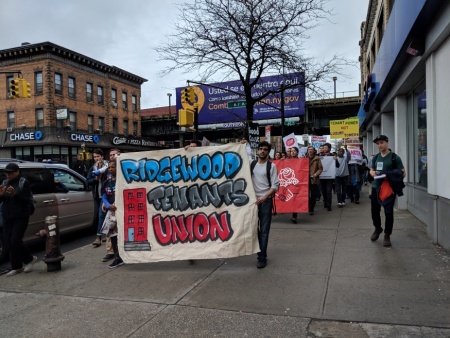
Ridgewood tenants march agains landlord harassment. (Ridgewood Tenants Union)
April 16, 2019 By Laura Hanrahan
A group of Ridgewood tenants and several elected officials gathered Saturday to protest a prominent Queens-based landlord, calling out the company’s alleged history of harassment and neglect.
Tenants claim that Silvershore Properties, which has amassed a portfolio of nearly 100 properties across the city, regularly ignores maintenance issues, raises rents in the middle of leases, and leaves tenants without heat, gas and hot water. The tenants argue that the company is using such tactics to force rent-regulated tenants from their homes.
In 2017, Silvershore was named as the number one “Worst Landlord in NYC” by then Public Advocate Letitia James.
Kirk Florendo, 24, recalled his nightmarish experience living in a Silvershore Properties apartment at 1708 Summerfield St. in Ridgewood. He said that he was the victim of a mid-lease rent hike and said that for months the building’s lobby had a gaping hole in it caused by leaky pipes.
“It was obviously an attempt to get people to move out so they can turn every unit into a luxury condo,” Florendo said. “They rarely took responsibility for any kind of repairs that had to be done. Requests had to be made out to either the super, Billy, who was equally useless, or the management company that seemed to change every few months. Even with those requests, repairs, if done at all, were slow and usually just put a band-aid over the problem.”
According to a spokesperson for the Ridgewood Tenants Union, the organizer of the protest, Silvershore tenants have also had to deal with peeling lead paint, mice and mold.
Ken Fisher, an attorney for Silvershore Properties, said that the allegations have no factual basis, stating that Silvershore is in regular conversation with its tenants to quickly address any ongoing issues, and have cleared thousands of violations against their buildings.
“It’s simply not true,” Fisher said. “And in fact, [Silvershore Properties’] entire approach has been to improve and maintain buildings that were neglected for years by prior owners, and many of the violations that they have now cleared arise from the prior neglect. At the end of 2017, they took the additional step of bringing in third party management with a mandate to address repair issues.”
According to Fisher, the Public Advocate ranking did not take into account the fact that Silvershore intentionally buys rundown buildings, counting violations issued before Silvershore purchases the property.
“In fact, the very week the Public Advocate released the report in 2017, more than 100 violations were removed by the Department of Buildings among a number of buildings where the work had actually been done months earlier,” Fisher said. “They basically inherited a lot of problems.”
Silvershore has not been placed back on the list since 2017.
Issues with heat and hot water this winter stemmed from a fuel delivery issue, Fisher said, and were dealt with quickly.
Protestors and elected leaders are calling on the state to close an array of loopholes in rent stabilization laws– and used Silvershore as a example as to why. They also called for Universal Rent Control measures, which would prevent arbitrary rent hikes to market-rate apartments.
Under current rent stabilization laws, landlords can increase the rent 6 percent per year by reporting Major Capital Improvements to a building, which includes work such as installing new windows or replacing the boiler. These reports, however, are often inflated, valuing the work at a much higher price point, or sometimes falsely report upgrades all together.
Several other regulations provide landlords with the opportunity to hike the rent.
Landlords are permitted to raise the rent by up to 20 percent after a tenant moves out, and after the rent exceeds $2,733 per month, the unit is taken out of rent stabilization permanently. These practices have resulted in a net loss of 147,512 rent-regulated units across the city since 1994.
State Sen. Julia Salazar was also in attendance at the protest, having earlier this year proposed a “good cause” eviction bill—a stepping stone to Universal Rent Control.
The bill would prevent landlords of any market-rate apartment from evicting tenants for not paying rent for units where the rent had been raised by more than 150 percent of the Regional Consumer Price Index taken from August of the previous year.
“Today, our rent-regulated system in New York City has seen countless units deregulated because of the loopholes that landlords like Silvershore Properties take advantage of in our rent laws,” Salazar said. “We have seen our friends and families harassed, priced-out, and displaced. It is for this reason that we need the strongest of rent laws.”
Assembly Members Mike Miller and Brian Barnwell, and Senate Deputy Leader Michael Gianaris also attended the protest, and similarly called for tighter rent laws.
Oskar Peacock, a resident of a Silvershore Properties building, shared his personal experience and spoke to the essentiality of Salazar’s bill.
“I have lived in an unregulated building owned by Silvershore Properties for two years, and for both those years I have experienced winters without heat, gas, and sometimes without hot water,” Peacock said. “Universal Rent Control, including State Senator Julia Salazar’s Good Cause Eviction Bill, is not only vital for the protection of tenants, but would provide the support tenants deserve to stand up and fight for their right to housing.”
New York State’s current rent regulation laws are set to expire on June 15, after last being renewed in 2004. The State legislature will vote in the coming months on proposed renewals of, and amendments to, the rent laws.





